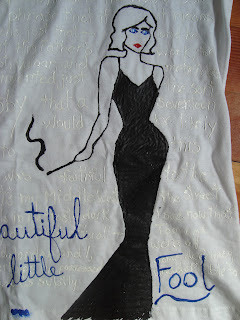I’m very picky about the scary movies and books I like. I
don’t like it in horror when you know right from the beginning who the villain
is—when you already know who the villain is as soon as the movie starts, that’s
a pretty good sign that what you’re watching is more of a slasher movie, where
the gore and violence takes center stage abruptly pushing aside (or skipping
altogether) the mystery aspect. They don’t give the audience a chance to wonder
what evil lies just around the corner, waiting to strike—essentially letting
the audience scare themselves more than the actual scenes and events ever could.
Suspense, in my opinion, is what makes a movie or a book scary. For me, not
knowing what’s haunting the main characters and snatching them one by one is
way scarier than any masked serial killer.
And that’s why Laurie Faria Stolarz’s series (Blue is for Nightmares, White is for Magic,
Silver is for Secrets, Red is for Remembrance) is one of my favorites. Though
I haven’t had a chance to check out the fifth book, a graphic novel called Black is for Beginnings, the first four
have been a permanent, and frequently revisited installment on my bookshelf for
quite some time now. This is the kind of book where if you’re reading it alone,
especially if it’s dark, and someone unexpectedly knocks on your door or sneaks
up on you, you may just pee your pants (seriously, it happened to a friend of
mine when I lent her the book…well, she didn’t actually pee her pants, but she
did jump and scream).
The main character in this book, Stacey Brown, has
nightmares (I know, I totally wasn’t expecting that either with a title like Blue is for Nightmares). What makes her
nightmares particularly scary is that they come true. Stacy has terrifying
premonitions about people who are going to die and if she doesn’t do anything
to stop these premonitions she knows, from experience, that they’ll come true.
Talk about a lot of pressure for a 16 year old.
I will admit, now that I'm older(and I’ve read the books almost fifty
times) the books aren’t as scary as they once were to me--and they may not really satisfy older readers who have more experience with the horror genre. They’re more gateway books into horror—the stories are
tame enough that readers less keen on being scared will still enjoy them, but
they give you that taste of scary so you can see if you want more. These books will
definitely have the right readers on the edge of their
seats. And even if they may not have you as jumpy as I was if reading them for the first time, I’d still say they’ll probably have anyone's heart going a little
faster than usual.
Plus, like I said earlier, what I like about these books is
that they’re frightening because the writer knows how to set up
that mysteriousness. You don’t know what’s going on—you only know enough to be afraid.
Like Stacey, you’re just trying to figure out what and who you should be afraid
of. Not only do you feel the fear of being chased, but you have the
anticipation of that fear from the riddles in Stacey’s dreams.
What I also love about these books (especially Blue is for Nightmares) is that they don’t
ignore the teenager drama and development while they’re setting up the scariness.
Though Stacy isn’t exactly your average teenage girl, she does deal with things
that many girls deal with at her age. She has crushes, best friend drama,
relationship drama, and on top of that she’s a Wiccan who has nightmares about
the future…And did I mention those nightmares are often accompanied by embarrassing
bodily functions like bedwetting? Yeah, Stacey’s got a lot going on.
To top it off Stolarz is a pretty solid writer. Her
characters, though maybe not the first of their kind, have enough originality
and character flaws to make them interesting (though I might actually say the
supporting characters are a little more original than Stacey—she’s reminiscent
of your typical shy-girl-with-a-secret main character). And Stolarz adds drama,
as only teenage characters can deliver. There’s that constant emotional
breakdown brewing beneath the surface, waiting to blow things out of proportion
and make everything into more than it is.
Stolarz lets you in on the lives of these characters as they
try to deal with growing older, forging identities, and maintaining friendships
and romantic relationships (especially when those friendships and romances
overlap). It’s just an added bonus that Stacey happens to be solving murder
mysteries before they happen. And, it’s great to be able to follow those characters
throughout the series—all of the books are solid and worth reading. Stolarz
doesn’t let her writing fall apart after the first one or two books.
So, I could talk about Blue
is for Nightmares until I’m blue in the face, but I don’t want to give
anything away—more than most other books, it’s important with these to leave
the mystery intact. Just know that this is definitely a series for the
bookshelf.















